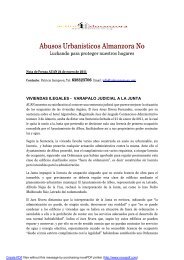European Property Rights and Wrongs - Diana Wallis MEP
European Property Rights and Wrongs - Diana Wallis MEP
European Property Rights and Wrongs - Diana Wallis MEP
Create successful ePaper yourself
Turn your PDF publications into a flip-book with our unique Google optimized e-Paper software.
Two aspects of EU competence will now be explored, the freedom to move<br />
capital to buy second homes <strong>and</strong> the control of cross-border marketing.<br />
Freedom to buy homes <strong>and</strong> second homes<br />
Citizens of the EU have the freedom to invest capital anywhere within the 27<br />
members of the EU, <strong>and</strong> this right also extends to the three additional members<br />
of the <strong>European</strong> Economic Area. This excludes, most notably Switzerl<strong>and</strong>. An<br />
unfettered ability to move capital freely around Europe is relatively new, derived<br />
from the Maastricht Treaty. This means that an EU citizen can buy l<strong>and</strong> in another<br />
EU or EEA state, can buy a main home <strong>and</strong> – a right exercised much more commonly<br />
– can buy a second home. There are associated rights of free movement for<br />
workers, those seeking work, <strong>and</strong> self-supporters; second home owners can visit<br />
anyway for short periods. Around 3 % of Britons have a holiday home abroad,<br />
<strong>and</strong> 2 % of UK net housing wealth is in Spain. The huge impact of the freedom<br />
to buy second homes can be seen in Spain. It is possible to impose controls on<br />
foreign buyers, as is done for example in the Austrian Alps, but these controls<br />
are policed very tightly by EU rules. Were Karl Marx at work today he would be<br />
writing about the Free Movement of Capital to Buy Second Homes. So the free<br />
market in l<strong>and</strong> created at Maastricht provides the backdrop to the problems in<br />
the Spanish l<strong>and</strong> market.<br />
Cross-border marketing<br />
One of the primary functions of the <strong>European</strong> Union is to provide a level playing<br />
field for the common market across Europe. It regulates cross-border transactions<br />
<strong>and</strong> ensures that domestic <strong>and</strong> foreign buyers <strong>and</strong> sellers are treated the same.<br />
This therefore opens the way for a <strong>European</strong> l<strong>and</strong> law directed not to the substantive<br />
law affecting l<strong>and</strong> but to the transaction aspects of l<strong>and</strong> purchase, including<br />
marketing, consumer transactions <strong>and</strong> cross-border contracting. A brief return to<br />
the example of timeshare illustrates the potency of the EU. Although a timeshare<br />
deal is partly a l<strong>and</strong> transaction (but really mixed in character) a <strong>European</strong> dimension<br />
arose, driven primarily by the volume of cross-border purchases. Europe<br />
acted to regulate marketing, giving rights to information <strong>and</strong> to withdraw from<br />
31



